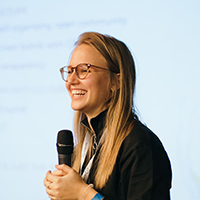I found this tool by accident through an article written by Michel Bachmann. It seemed to serve our needs so a colleague and I simply sat down and started to fill it out.
It was very helpful to have someone to complete it with. We sat and talked for hours because it does make you start thinking about things we had not considered before. So, take your time to fill it out. Once completed, you should probably frame it and it put it on the wall so it’s always there as a reminder. I also recommend reading the handbook that comes with it to help you better understand many aspects of community development.
Our community management team regularly revisits the strategy to check whether the community still aligns with the set goals and values etc. This is a tool that in critical moments can help you realise what’s missing or what’s not as you originally intended.
We want to be an open, dynamic, self-organised and action-focused community. We revised our previous values and have come to the conclusion that we didn’t actually fulfill them. That is why we decided to re-discuss these core principles of our community. Consequently, we sat down and examined what we really are (members, capabilities, potential etc.) and what the world really needs when it comes to climate action–this can lead to very philosophical conversations. We also looked at answers from a member survey administered a year ago that asked members about the values and goals of the CKAA.
To come true to our values we realised that two changes need to happen:
- Our community is built on strong bonds between people, however this is limited to the entrepreneurs directly involved in one of Climate-KIC’s programs. To truly be open we will transition from a closed to an open community.
- Even though our members are already proactive when it comes to generating climate action, we realised the potential to catalyse existing efforts more given the urgency of the climate crisis. Therefore, our activities will shift to support the action-focus even more.

Only the community itself has the power to create the culture but it can, and should, be done consciously and purposefully. This can happen at community gatherings and will be reflected in community activities, rituals and processes. For many of our community members, a sense of belonging together is the most valuable aspect of CKAA. This is something that can be preserved and strengthened as we develop a new structure (as we are in a transition period at the moment) and adopt new cultural traits.
The elements of our culture are: transparency, collaboration, trust, future energy, shared goal(s), collaboration, self motivated, taking action. These might sound obvious but we realised that even though those might be lived by many members, we never really communicated them directly. How could we expect members to embrace a culture that we have never actually articulated? We are now discussing the culture more often which also allows for us to reconnect to our culture and values in moments of conflict.
We see this as an experimental process that may take some trials and learning before the community develops a culture that suits the context and structure of this network. In line with all other elements of the community, the culture will also remain fluid so that it can evolve with the community.
Team Human is a great podcast, they also published a book.

